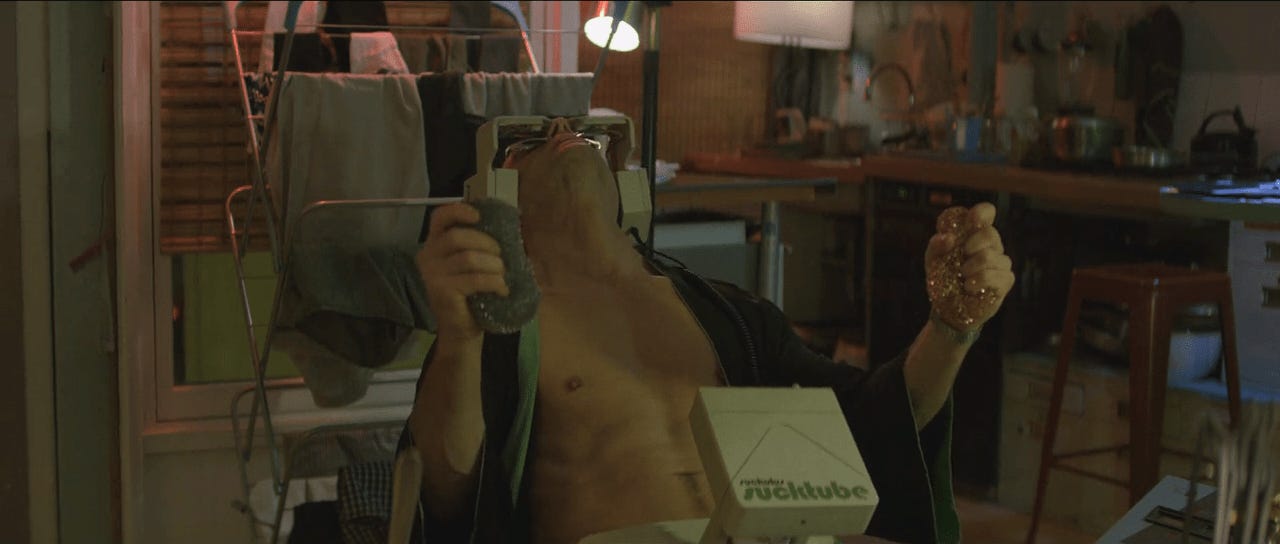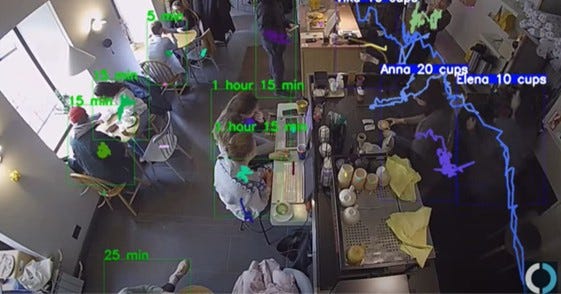Conquering The Power and Pleasure Instinct
Humanity’s Next Boss Level
I’m optimistic about AI-safety to the extent I’m optimistic about the psychological and spiritual development of humans.
Why?
A reason that one of the most successful and revered tech startup leaders simply answered in 2007:
In a great market—a market with lots of real potential customers—the market pulls product out of the startup.1
Marc Andreesen
Technology isn’t force-fed. For the most part, we have a say in the tech we use. If a need exists, the technology will persist to fill that need. If the need is nonexistent, the technology won’t work.
Yes, some of those technologies play on primal instincts. Needs that we struggle to control. Such as the case of social media algorithms that are optimized for addiction. The short-form infinite scroll takes that addiction optimization and puts it on an IV drip. I think it’s misguided and harmful, but should we blame the technology? Its creators?
When we point the finger at the creator or its creation, we project the responsibility onto them, thereby transferring our autonomy away; so that we can do what, exactly? Continue scrolling without feeling bad?
It seems that despite the pervasive effects of some technologies, we still use them.
I invite you to respond to a quick thought experiment: What if tomorrow, we collectively decide to delete our social media accounts? We quit using them. Would it persist to live?
It may for a while, given the massive runway of cash at the backs of tech giants, and the sticky nature of protocols, but not forever. Or maybe, the social media algorithms would pivot until it found what the market wanted.
I don’t think we should delete all social media. The positives that come with social media are many; we just need better relationships with it—particularly given the mass scale mental illness induced by it2. The more pervasive the technology has the potential to be, the more precise (and conscious) the boundaries need to be.
That attitude needs to be applied across the technological spectrum. Most importantly with AI. The direction it ultimately goes, is where we want it to; whether unconsciously motivated or not.
The cynical start to this piece leads to a sobering and optimistic conclusion: to the extent that we pull products out of the market, is the extent to which we can fix ‘evil technology.’
I want to start with the general worst-case scenarios we’re navigating between—the ones we’re pulling from the market—and finish with how the individual can practically navigate their way through these paths, which is an answer you probably won’t want to hear.
Pleasure and Power
In David Foster Wallace’s Infinite Jest, he imagined a film that is so compelling and addicting, that viewers cannot stop watching it, ultimately dying.
In George Orwell’s 1984, he imagined a big brother system which is always watching, ensuring citizens’ compliance—words and actions—with the party’s commands.
Wallace’s imagination was one of uncontrollable addiction to the whims of hedonism. Orwell’s was one of engineered tyranny from an inability to control the grip of power. Both are on the table. The ability to navigate through the straight and narrow is in play only to the extent our ability to mature and control those impulses are.
The infinite scroll of short-form videos plus the addiction-optimized feed is something that the human brain seems to have trouble getting its hands around. Now, imagine a future where the algorithm is not only pooling from the creation of human creators, but can generate a video from scratch based on what it thinks you want in that moment. Or an AI companion will send you a message based on what it knows will satiate your impulses3.
Maybe that’s a chat with a fetishized 18+ pornographic anime AI companion (Yes, these exist — Grok’s Ani).
Or, it’s a quick round at the sucktube (No, this one doesn’t… at least as far as I’m aware).
I’m ambivalent about AI companions. On one hand I think: Why aren’t we communicating with other humans? Have we gotten so lonely that our intimacy, self-development, and friendship require outsourcing to AI? On the other hand, I think, well, if it can help people who are lonely, why not? Is it possible that this is the formation of our relationship with an emergent species?
There’s one thing, though, that’s certain about the hedonistic route: we’re stuck in its grips. If not the draw of the sucktube, drooling at the Infinite Jest, or the temptation of AI companions, we must beware of Big Brother and the human temptation to unlimited power.
Like the hedonistic impulse, this one is ancient. It seems that many people with immense power abuse it and become corrupted by it.
How does this apply to AI? Though not as evident as the hedonistic impulse, AI systems would expand the reach of power. Especially as energy output increases and costs decrease (seems likely). This would cause the energy expenditure on AI surveillance systems to reach near-zero.
One crazy dictator with innumerable AI agents becomes a sprawl of tyranny at an unseen degree.
Are we far away from this future?
Look at this coffee shop wielding a technology called Neurospot, a CCTV-AI tracking tool that tracks employee productivity; it might be early-days, but it’s there.
The pieces of Orwell’s 1984 Big Brother are mostly there; it’s just a matter of the tools getting into the hands of those who cannot oppose the power-drive.
Like the grasp of the pleasure-drive, humans have struggled with their relationship to the power-drive. Those who don’t have it say they’re oppressed by those who do. Those who do have power say that they know what’s best for those who don’t. When those who don’t have it, get it, it’s as if they do exactly what they thought they wouldn’t.
As the cliché goes: “absolute power corrupts absolutely.”
Is there a better commentary than Lord of the Rings? For Tolkien, power was an impossible force to resist. By its nature the draw to unlimited power—the One Ring—corrupts. The story argues that real authority over power lies in renunciation, humble stewardship, and reluctant rule. Optimistically, it shows us there is a spirit (read: pattern of behavior) that one can embody to resist the power-drive.
I don’t think that power inherently corrupts. It amplifies and reveals.
Hierarchies can be maintained in a cohesive, honest, and benevolent way. And maybe, as AI improves, we can use it to improve our autonomy to the extent that it can be integrated into our systems to keep power-balances in check while we continue to mature those instincts that grab us.
This is where the big question I raised earlier arises: How do we walk the straight and narrow through the pleasure and power minefield? How can we solve this problem?
It’s an answer so boring that I’m not sure if I…
Fine.
Put in the work
This war has pitilessly revealed to civilized man that he is still a barbarian. . . But the psychology of the individual corresponds to the psychology of the nation. What the nation does is done also by each individual, and so long as the individual does it, the nation also does it. Only the change in the attitude of the individual is the beginning of the change in the psychology of the nation.
C.G. Jung
December, 1916
I’ve become averse to providing my answer to this problem; it’s the moment eyes gloss over.
But it is, by far, the most practical one. It’s something everyone can do: psychological and spiritual growth.
No, this isn’t the only answer to stopping the potential misuse and tyranny of AI. Yes, there are technical dynamics of the AI system at play. Yes, there may be regulatory requirements that improve the probability AI doesn’t eat us all. And yes, maybe some economic incentives should be rewired toward AI companies to ensure they don’t err on the side of profit-over-people.
So, let’s try to remember that the individuation process is not the only answer.
But it’s the best one.
Everyone has the choice to find a psychological and spiritual modality that works for them, and to improve themselves. So why doesn’t everyone do it if it’s that simple?
Well, for one, it might seem futile. It’s also hard work.
You need to consult with yourself and admit something is inadequate, the part most don’t bear to start. Then you need to endeavor to find what that insufficiency could be. After which, you spend most of the time not implementing the solution but trying to accurately formulate the problem. And then once you formulate the problem, you need to find the practical solution to implement into your life, build processes around it, and stick to that solution so that the problem which surfaced your admission ceases to exist, transforming for the better. Then, you need to learn to love the process and repeat it, because ultimately, the upward struggle is part of what it means to be human.
Yes, individuation won’t solely solve the AI issue.
But
Can I offer up the fact that this is something that everyone and anyone has the capability to do? There are a small minority who can directly rewire the economic incentives or update technical safety constraints.
The nice thing about the proposed solution is that even if you are the only one around you who commits to this process, at least your life will be better (and likely everyone around you through influence). Either more people are talking about it, or more people are waking up to the fact that if we want to walk in an era of intelligence greater than us, we need to be prepared on a spiritual level.
I also tend to think it’s one of the reasons we’re seeing the rise of The World Wise Web. These communities allow everyone to access resources which allow them to elevate their consciousness and strive toward integration of their left brain (rational, logic, order, scientific processing, etc.) and right brain (creative, intuitive, artistic, emotional, etc.).
Tom Morgan recently defined these communities as: A max-150 person digital network. Membership is paid. Members are “wise-agency,” in terms of skills, resources, executive function and motivation… The group pursues wisdom practices, the evolution of consciousness and ways to deploy their powerful skillsets in positive-sum ways. The ideal vibe is curiosity, humility and practicality.
Doing inner work is, by its nature, lonely. So, having a community to help along the way is certainly a good idea if you’re otherwise averse to these ideas.
I wish the answer were sexier, but it’s the one that gives you the most agency. The one that you can start today. And the one that—regardless of its impact on society—is bound to improve your life.
Do the inner work necessary—through whatever spiritual/psychological modality works best for you—and find an orderly way to integrate those impulses healthily into your life. This will help you better manage the drive to engage in the hedonistic pleasures offered by AI and will help you refuse the corrupting nature of power as you assume more of it in your life.
The choice is in our hands, not AI’s.
Let’s choose wisely.
Take care, everyone.
Dom
This piece deals with the abstract idea of “psychological and spiritual development.” Some may wonder: what does actually look like in practice?
I think it’s important to make these ideas implementable into the day-to-day. So, at some point, I’ll write about what works for me and is baked into my routine.
I might also explore how others pursue the growth of psyche and spirit in practical ways. Or better yet, bring in guest posts from people willing to share the specific modalities they study and/or use.
If you enjoyed this post, or would like to see the more grounded way of exploring these types of things, you can subscribe.
Look no further than Jonathan Haidt’s “The anxious generation.”
Funny enough, just read this article a day before posting: Facebook is getting an AI dating assistant.







